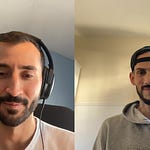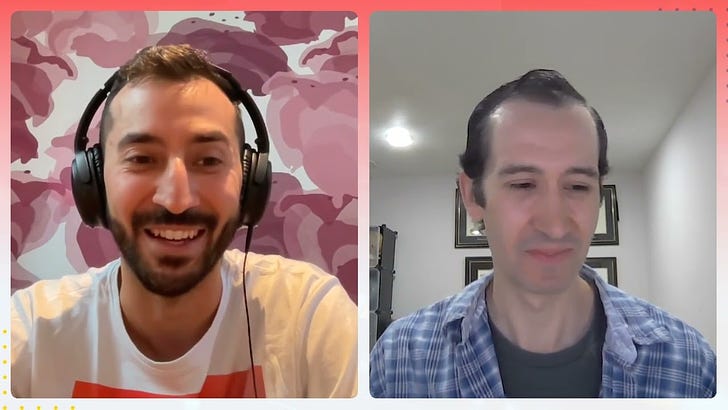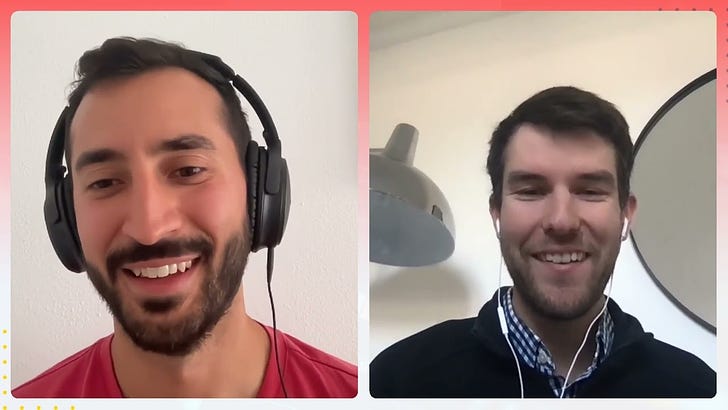Kirill, originally from Estonia, is the founder of Stakewise, a liquid staking platform on Ethereum. Always interested in economics and finance, he initially was not interested in Bitcoin due to the lack of friction in the financial system in Estonia. However, he quickly came to understand the importance of Bitcoin in countries with corrupt governments, as it allows people to own their money and transact without fear of it being taken away.
At university, Kirill became interested in Ethereum and invested in it. He saw the potential of applications that could be built on top of it, and was not happy with the growth opportunities in the traditional financial sector. Therefore, 11 months ago, he quit his job to work on Stakewise full-time. Today, the team has grown to five members and the product is seeing gradual adoption in the DeFi space, such as being included in the Fuse Pool.
The idea for Stakewise originated from the need to make it easier for the average person to stake their Ethereum. With the requirement to have 32 ETH, the task can be daunting. Kirill and Dima developed Stakewise with a token that was the first to launch on a public test net. They are dedicated to helping people avoid crypto scams by educating them on the potential dangers and the most popular ways to scam people.
Kirill is passionate about Stakewise and ultimately wants it to be the leading staking platform. He is excited to meet people he has only chatted with online when he goes to Lisbon next week, and he recommends diversifying one's investments across multiple staking services in order to reduce risk. He also educates others on basic security questions, such as never sharing one's seed phrase or private key.
Kirill is satisfied with his career move, despite the initial shock from his parents when he no longer had medical insurance. He is proud to be part of a decentralized system that requires a lot of people to fail at once in order to break, and is aware of the potential of governments developing their own blockchain protocols. He is hopeful that Stakewise will help people hold on to their money, and ultimately make their lives easier.
Links:
This following post was generated using AI via dubb.media 🤖
Transcript
[0:00:00] Rudy: Hey, Karill, thank you so much for joining me on Wholesome Crypto podcast today. It's a beautiful Friday morning here. I know it's a Friday afternoon for you in Estonia. Thank you very much for joining me.
[0:00:13] Kirill: Hey, Rudy. Yeah, it is my pleasure. Thank you very much for inviting me over and giving me the opportunity to appear on your podcast. Of course I'm excited for of the conversation.
[0:00:26] Rudy: Of course. That's my pleasure too. Yeah, I mean, you have a great background working with Stakewise. You and your co founder Dimitri have done a lot of work there. Before we start getting into all what Stakewise does, I love to learn a little bit more about you and what you've done in your past and your history that led you up to working and starting up Stakewise.
[0:00:47] Kirill: Yeah, interesting question. So I'm originally from Estonia, and I think I've been always interested in the economics and financial sort of dealings of just like, companies and businesses. And this led me to pursue an economics focused degree. And later on, I ended up working for an investment fund here in Estonia.
[0:01:16] Rudy: Sorry, I said no. Was it the challenge of solving a mathematical equation for you? And obviously money is a fun thing to solve because so many people love it so much. But what part of the challenge that got you was getting you excited about economics and making you focus your studies on that?
[0:01:39] Kirill: It's an interesting question. I tend to think that it has to do with my love for solving puzzles. Oftentimes I'm not a fan of just, like, crunching numbers for the sake of, I don't know, accounting, for example. I'm mostly interested in crunching numbers to try and model some scenarios for the future. So it's more like trying to understand how the different components of one big system come together and finding a way to approximate their dynamics individually and to see what sort of global result this can end up with. So I don't know whether this is the sort of pursuit of certainty about the future or it's just the process itself. It always drew me towards economics, and I think a big part of it is also like the behavioral aspect. So trying to figure out how people's behavior influences just economic outcomes, that's super.
[0:02:56] Rudy: Interesting in crypto, because emotional behavior is a hefty player in the game after people underestimate how much emotion is used in crypto.
[0:03:08] Kirill: Yeah, no, 100%. I think crypto is just one big experiment on people's attitude towards money and behavior. It's like a giant gambling machine. And although it's still sort of an infancy, I do think that a lot of what we see in VFI is driven by just pure game theoretic sort of behavior, and it can be modeled as such. And then there's this element of uncertainty still where community and wholesome values somehow still overrule, just like parasitic behavior or some sort of self.
[0:03:56] Rudy: Yeah, it's like a win win because self is behavior. Everybody that's investing in crypto early on, of course, wants their portfolio to increase in value, but they also do care about the mission of giving everyone the power to be able to take full control of their assets and their value and their money. So, yeah, it's definitely going to see that happen and play out and perhaps.
[0:04:24] Kirill: Occasionally also not letting something obviously bad happen to others in the community. Basically trying to deter people from making a mistake or just making sure that everyone's on the same level playing field. It does interest me how sometimes these actions are driven by just altruistic motives. But again, I think it's like a small section of crypto. There's still a big section out there that is purely just optimized for the best personal outcome and don't care about the ethics at times.
[0:05:02] Rudy: Yeah, for sure. And again, if something bad happens to a network or protocol a coin, if it happens to happens to everybody, everyone gets affected by that one issue. It's not like, oh, someone got scammed at their bank, therefore everyone else is still safe. Just that one person screwed. Now everyone is affected if there's a protocol level issue or a community level issue or anything like that. So it's always important to remember there's like one for all.
[0:05:35] Kirill: Most certainly, even from the sort of financial perspective, it will play a much bigger role simply because you start getting assets that are sort of composable across the system. Which means that out of, say, 100 units of capital, you might end up with, like, 600 units because you can rehypothecate whatever you have in different protocols, just stacking things on top of each other. This creates just this massive value. But at the same time, if one of these domino pieces falls, it can puncture the bubble, so to say. So looking after each other, perhaps at some point they need to self regulate basically as an industry within this system will probably drive people to act against this bubble being punctured.
[0:06:41] Rudy: Yeah. And I have strong faith, hopefully in the community to work together on that one. You're loving economics. This is what you're starting to figure out what your passion is in high school and then in college you focus on that. But when did you hear about Bitcoin? Was it during college?
[0:07:03] Kirill: Yeah, I think like many people at first heard about Bitcoin while still at high school, but like everybody else, I just didn't see the proposition. At that time I was, I don't know, pretty happy with the financial system. I did not sort of encounter much friction in terms of how you need to interact with various intermediaries. And I would say that perhaps it is because Estonia is pretty developed in that sense. We have the Swedish banks that represent the majority of the, like, financial system here is in from the banking side and they have created relatively few frictions and I cannot say that they have been too charging to have TFC or anything like that. And at that time, I wasn't really sending money abroad too much or having money yeah. Doing anything that bitcoin solves. So I just didn't see much of an appeal. Especially because you couldn't transact with it in stores.
[0:08:13] Rudy: Exactly. That's like the huge thing I've always recognized is like, especially in America too, there's so many ways to send money to people for free. Like, I can use venmo PayPal, I can now use Facebook to send money to people and they make it so easy. It kind of makes you forget why bitcoin was so important. Why would I want to pay a transaction fee for every transaction for this digital money that don't even know has any backing towards anything? It's very easy to speculate, but when you look at it through a perspective of a different country where government regulations are much more corrupt and it's not easy to send money, it's not easy to even store your money or know if the money that you saved is going to stay there for you tomorrow. And that's when bitcoin really or ethereum or most cryptocurrencies come into play, is that you get to have that ownership and you get to show that you own the money. You can send the money whenever you want and no one else can take that away from you, no matter how corrupt the government is.
[0:09:20] Kirill: Yeah, a monetary sort of argument comes into play here as well, I guess. It seems to me that I've only come around to the need to manage the monetary supply to make sure that inflation is kept in check and you don't sort of pump a lot of hot air into the system. Just recently with the pandemic and the limited supply or, I don't know, a slowly growing supply or some sort of algorithmic side to how the supply is changing, which makes it predictable. It's important to have if you want a currency that is not going to go away in like 100 years just because you as a nation state somehow lost the appeal on your floating rate currency. It's just being devalued constantly. But, yeah, coming back to your original question, I discovered bitcoin, like, relatively early on, but I just didn't was it.
[0:10:25] Rudy: A friend that saying, hey, Karl, you have to look at this, or how did you find it? How'd you hear about it?
[0:10:31] Kirill: I think it was just like randomly browsing through the Internet. Yeah, I guess bitcoin came on everyone's raiders multiple times, but everyone sort of brushed it off multiple times because you're like, oh, whatever. This just random coin that is being transacted with nowhere, so what's the point of having it? And now you recognize that, okay, perhaps this was a good bet, but in the end, I didn't act on it and I came around, I think, as most people did as well in this early 2017 cycle, or mid 2017, but not for bitcoin, for ethereum. I just got some once I got out of university because I loved sort of the idea of various, essentially applications that it is possible to build on top. So just got some. But yeah, again, I was, like, sitting underwater for the longest time ever after that.
[0:11:38] Rudy: Yeah, you got it then, I guess. Bitcoin was always on your radar. You're kept hearing about it and I guess you never felt like you had to invest in bitcoin or ethereum immediately. But it was always something you're kind of just keeping an eye out, watching and seeing what's happening in the industry as it was slowly, slowly picking up.
[0:12:02] Kirill: I would say that it was only just for the fun of it when I opened it. I cannot call myself like, a crypto maxi until, you know, only recently that I came around. I think for for a long time it was just like to watch the price for fun, to like, you know, ponder on the question how much you could have made.
[0:12:25] Rudy: That's the worst. Don't do that.
[0:12:27] Kirill: Like 2012 or something.
[0:12:29] Rudy: Oh, man.
[0:12:29] Kirill: But here's the deal. The majority of people would have never held it from that period of time until now. For example, I remember friends bragging how creative and great they are of traders because they bought it for, like, 100 and sold several weeks down the line for 400. You're like, oh, man, I made four X.
[0:12:52] Rudy: That's pretty good. If they held it, they could have made way more.
[0:12:58] Kirill: Yeah. So I honestly don't know what sort of mindset you need to be in to hold from, like, the very first instance to the current days, and I'd be interested to talk to such people, but in the end, you have to.
[0:13:16] Rudy: Just buy I forget it. You can't even think about it because it was just driving nuts. The what if.
[0:13:22] Kirill: Yeah. So he came on my radar again when the whole buzz around it started picking up. And at the University of Friends, he basically said, hey, so there's this new currency that was released not that long ago. That still a very attractive proposition. Like price wise, you can get a lot for relatively little, and it has this appeal and the technical sort of foundation for being universally used. So look into that. At the time, we looked at the ICO boom and thought, okay, some random projects are getting lots of money. Some random factories in Russia, just like, collecting money for expansion in crypto, just.
[0:14:17] Rudy: Churning out fake ICOs just to make some money.
[0:14:21] Kirill: Yeah. Loads of advisors on board.
[0:14:26] Rudy: Yeah. I have nowhere. So many advisors came up. I'm like, how are you an advisor? Crypto just started. How could you be an advisor? I can be an advisor at that point then. But that was just yeah.
[0:14:42] Kirill: Literally all that mattered were the traditional sort of signaling mechanisms. The longer your tenure, the higher the position. The sort of catch, here the company you're at, or the educational organization that you graduated from, the better, like, oh, these guys are from MIT. They must really know their I am.
[0:15:09] Rudy: From Boston right now. But yeah, it's exactly how it is. Ex google Engineer x something engineer well.
[0:15:17] Kirill: These things are still broadly appealing because I actually don't know why. I guess on the surface, if you compare people who haven't had that experience and some that had, you will go for the latter. But back then, yeah, all kinds of things were considered, like, noteworthy and investment worthy. Not all, but most of it turned out to be hot.
[0:15:47] Rudy: Yeah. And it's all exposed eventually. So I'm kind of worried about that happening in the NFT space right now. With all those it's automatically computer generated art, and there's only 10,000 pieces. And so, myself, I'm like, It's good, it's great. But what do you get out of it? What's it supposed to bring to you in terms of utility, in terms of art? It's fine. If it looks beautiful and you're it's really appealing to you, they should get it. Sure. It's nice to have that kind of ownership, but sometimes it's like, what are you really getting out of it? Sometimes it's just a fun, loud community and it's cool to be part of it. But I guess for me, I'm also worried about there's a lot of NFTs that are coming out that are just trying to make their money and make promises that they won't ever deliver on.
[0:16:42] Kirill: Yeah, well, I guess it's different. It is difficult to have innovation in the space when it doesn't promise this outsized gains to people. In order to come up with something like relatively risky, where you're potentially wasting a lot of time and resources on building something, you need to have a long chance of striking. It's super big. This tends to attract speculators whenever it's a proven concept that it actually works, and the chance that you make it big is much higher than you anticipated. But yeah, within the the I think I couldn't come around for, again, a long time, I have been in, like, brief conversations with different people who were obsessed with NFTs very early, and I just couldn't get the appeal besides just the art components of it. And oftentimes I still don't. I think I'm more sort of interested by the speculative side, too, like how NFTs came around. But down the line, I think the biggest appeal is if they actually managed to cross into the metaverse.
[0:18:02] Rudy: I think it will. I hope it will. That's the whole point, right?
[0:18:06] Kirill: Yeah, exactly. So fingers crossed. I'm curious to see how it develops. I don't hold any NFDS at this.
[0:18:15] Rudy: Moment, but yeah, maybe stakewise community will start developing NFPs. Maybe stakewise community will start developing NFTs for fun.
[0:18:28] Kirill: Yeah, well, we actually have at least one. It's a semi NFT. It's this proof of attendance protocol type NFD where we didn't even develop them. I think the rocket pool folks made this meme about Stakewise helping rocket pool avoid the potential exploit. And they made it into a meme and then into NFT. So I don't know if you've claimed.
[0:18:56] Rudy: Yours I actually did, yeah, because I saw it on your discord. I was like, oh sweet. I love these pops. They're fun to collect and they're free. It's not like they cost anything else. You want them into it.
[0:19:09] Kirill: No, very true. I have one of my own now, but okay, I have it.
[0:19:20] Rudy: Well, it's nice because now you can say I was there for that event. Imagine when there was co ops for when Ethereum launched and then you can say I was there for the launch date. It's cool. So now when Stakewise maybe adds on or develops with layer two, you can launch a pop saying, hey, we launched everyone that wants to improve their attendance for this. Just enter your ETH address. So wholesome crypto e. You can see all my pops there.
[0:19:55] Kirill: Yeah, I'll actually look it up.
[0:19:57] Rudy: Yeah, they're pretty fun. I've made a few just for other communities, but yeah, sweet. So you're out of college. We'll go back to that. You're out of college, you're working in a financial company. Could you go a little bit more about what you're thinking at that time, what you're working on, and when you started maybe going back and forth in your head of traditional finance or crypto finance?
[0:20:25] Kirill: Yeah, so I think those started when I began playing around with DFI, or at least the early sort of how would they call this?
[0:20:39] Rudy: Exchanges? Decentralized exchanges.
[0:20:43] Kirill: Yeah. DEXes. Yeah, Dex is just playing around with that and yeah, it was pretty fun. I have to say. It was nice to finally be able to do something with you either. I think at some point just was just observing what's happening. And that was around the same time that I was not super happy with how growth is in the financial sector. Like personal growth, basically, be it career progression or the kind of stuff that you get to do, you're always sort of building on top of the existing system, which is just at times, like, irrational and down the line. I just didn't feel like I want to do this for the rest of my career. At that same time, I think Demi, my friend Dimitri, who is the founder of Stakewise, came back to Estonia from Sweden for the Pandemic. And yeah, we sort of met up just as friends and he told me about Stakewise and from there it kind of was a very natural progression of me going into DFI with Stakewise.
[0:22:16] Rudy: When did you make the full jump over to Stakewise?
[0:22:22] Kirill: Yeah, actually roughly eleven months ago. So on the 9 November I quit my job to work on it full time. We were approaching the launch of e two as an ecosystem. And at that time, we were going into our second sort of the final beta on the final test, and we were trying to raise and there was a lot of stuff to coordinate, and I couldn't do it in my free time anymore like I did this whole time before throughout 2020. So, yeah, I just quit, said, okay, all or nothing. And, yeah, I'm glad it worked out. It was super exciting.
[0:23:13] Rudy: Do you have family members saying, what are you doing with this? What are you talking about? My parents are like they're kind of support and not supportive at the same time.
[0:23:21] Kirill: But I didn't tell anyone. Still, I didn't tell anyone, and I'm glad that I didn't. My parents found out super randomly because my mom called up my what is it called? GP, like, at the hospital. And it turned out that I don't have medical assurance. And she's like, what the hell? Aren't you working price to price? I no longer work.
[0:23:51] Rudy: That's the risk you take for entrepreneurship. You just got to go, and you're young, you're healthy, it's fine, you'll figure it out.
[0:23:58] Kirill: Yeah, she didn't tell anyone what she knew. In the end, that's love. But yeah, no regrets there. I wouldn't have told, I think, if it didn't work out, but it did, so it's all good.
[0:24:20] Rudy: How many team members are in state wise?
[0:24:25] Kirill: So right now we are five. So we have myself and DEMA, two other engineers, which are both called Andre.
[0:24:35] Rudy: Andre and Andre.
[0:24:37] Kirill: Yeah. It's difficult to differentiate between them and calls for, like, Andre, what is it? And then we have a person from the US. He thinks Brian and he's been helping out a lot. We actually were quite lucky with our community because many people were helping out a lot. Their names were I mean, they are from Europe and the US. There's Sasha, who helped us moderate this court and help with setting up some just community things. There's Blood, who was of immense help for just the UI and big portion of things we rolled out over Spring when we were very strapped for resources, just human resources and a bunch of other people who were always super responsive to the community. And we still are maintaining communication with them. And so I don't count them as part of the employed team, but they're definitely a part of the core statewise team. This is no debate.
[0:25:52] Rudy: Yeah. And it's always amazing having you're working on something you love so much and sharing that love with other members is just an extraordinary feeling.
[0:26:03] Kirill: No, absolutely. Yeah. Nothing to that for me. Just really glad that they came around and they discovered us and we somehow managed to strike up a friendship with them. And I just hope it continues. I'm very keen to meet them in person at some point, so yeah, I got it, too.
[0:26:27] Rudy: Well, you're always welcome to the States here.
[0:26:31] Kirill: Yeah, that would be lovely. I actually considered coming to Boston because of a friend who is beginning his studies there. He invited me over. So, yeah, I might as well arrive unexpectedly.
[0:26:49] Rudy: We'll get some lobster rolls and clam Chowda. So you're in this state of developing, working on stakewise, and Demetri founded the company. So how is it that the idea of we have to solve or help Staking on Aetherium? Did Dmitri say, hey, it's going to be difficult for the average person to stake their Ethereum on a note or on a computer or create their own node at home? And even alone, having 32 ETH is a lot of Ethereum. So were you immediately convinced that this was a problem that needs to be solved or how is that for you?
[0:27:37] Kirill: Yeah, I think in terms of the product market fit, I think it is an operator that you need to somehow pull assets together because not everyone wants to earn passive income from EIFER, has the necessary 32 EF and is able and willing to run their own infrastructure. And like, going further, it's also a no brainer that if you have an opportunity to earn interest from your Ether while you're actually also using it in various D Five applications, you will do it right. And there's this lock up requirement you would want to avoid as well. So the idea of building a Staking service with a token came very naturally. And at the time that I joined Dima with this, I think we had an Alpha product which is basically like shared validators. What you could do is spin up a validator with several people, but there was no token. And we developed a lot of things on top, basically, but the sort of core functionality was there. And Dima, I'm not sure how he managed to pull it off, but in the two years before I joined, he was building this on his own in his free time working on steakwise. And because of this, we were actually the first to launch on a public test net to give people a flavor of what east to Staking can be with the sort of defy oriented service. It's pretty amazing that we expected that EF Two is going to launch in July 2020. So we were like, okay, we need to rush with certain things. In May, I think we launched on the first test net, or it was the second test net, but we launched like a working product, essentially, and we started trying to get people to try it and get some community. A lot of people were excited about rocket pool, and it didn't really matter that we had the working product, they just were very convinced that rocket pool is the way, so they didn't even pay attention. But yeah, I think slowly, like, one by one, some people started coming around and testing it and yeah, in the end, I think this this head start back in May gave us a really good sort of runway to build a community that is sufficiently large to to get us off the ground, like, relatively quickly. Back when we actually launched in March 2021, yeah.
[0:30:37] Rudy: And I love I think Stakewise and Rocket Pool are my two favorite communities and staking platforms, probably. And you guys are kind of also like friends, which is kind of cool, especially with helping out Rocket Pool in terms of like that's what we're talking about before. Even though you are two different platforms doing two different ways of staking, it's overall good for the community that you both succeed versus trying to drown the other one. It doesn't help either of you. Yeah, and I like seeing that between the community. I think that's very wholesome that's just like what Ethereum is pretty good at too, is keeping kind of a wholesome community.
[0:31:26] Kirill: I hope that we will be able to maintain this sort of relationship going. It wasn't always like this, I can tell you, because oftentimes a lot of people used to talk down and take wise on Reddit and I vividly remember basically reading those comments because I signed up for notifications every time Statewise or Rocket Pool or any other staking service was being mentioned on Reddit. And I would read all of them and it would be a good sort of gods for the sentiment around different projects. But yeah, I think this slowly changed. We never tried to be I don't know, we never tried to be confrontational. If people discovered us and they wanted to try us and they wanted like a fair assessment of what's been happening in two different products, we'd always try to offer this fair comparison. Right. And we were always relatively transparent about what we see out the risks with their product or the advantages of our product and vice versa. In the end, what I believe an average taker can benefit from is just sticking with several services at once. This is good for differentiating your risk. It's like not keeping all of your eggs in one basket.
[0:32:56] Rudy: Exactly. Yeah. That's needed. I think it's important. If you're not a company with competition, then you're not probably needed at all. So it's good to have competition. It's good to have friendly competition.
[0:33:13] Kirill: Yeah, it is. With this in mind, basically, you can think of us as competing products and we are competing products, but for the average Staker, we actually sort of don't think that they should choose either or. It's probably best to be using, I don't know, two or three just to make sure that you are relatively safe in terms of how safe your capital is. Obviously we do our utmost like everyone else to keep it secure. It's literally a very big commitment that we make. That being said, there are always risks with innovation like this on the client side somewhere else, like we discovered with Rocket Pull and Lido, for example, who would have thought. We started looking into decentralizing our protocol, starting to look at how our competitors are dealing with certain things and it turned out that, okay, there's this glaring hole in how to do this that allows the steal users funds, I'm confident, but I still hope that we don't have any spots that we missed in what we do. If they're out, they will be as sort of friendly in reporting them in a timely manner. But down the line, what this means for the average staker is that it's best to not keep your eggs in one basket, especially as ifer appreciates because it has a high chance that a good chunk of your net worth will be in EIFER by, I don't know, 2025.
[0:35:08] Rudy: That long.
[0:35:10] Kirill: I mean, I don't know how people sort of diversify between crypto and other assets, but I'm just thinking just longer term, what's the point of just emotionally being invested in just one platform when you can be sort of more rational with your investments?
[0:35:29] Rudy: That's why I worry. It's because we definitely something people forget is putting all eggs in one basket is not a sound move to make because it's just traditional investing diversify and make sure you're able to stay safe in case of anything happens. And that's like what's the tough part about two is. You know, there's a lot of bitcoin maximalism going on around. I love bitcoin. I think it's what kind of brought everyone here. Even ethereum was started off just because bitcoin was there. It's like an idea that derived off of bitcoin and I think it's always important to remember that. Yeah, bitcoin is important, ethereum is important. Many other coins are going to be important, hopefully, or they're going to phase in and out, but there's a place for everything and I can't imagine a world where one coin will be the ruler of them all, that it's not going to be one coin for everybody. There's always going to be a handful of things to choose from, most certainly.
[0:36:38] Kirill: And I think this also opens up good discussion on what coin or what blockchain will, if ever, governments or public institutions adopt. And it seems like there will be no winner. So the bridges between different networks are all the more important.
[0:36:57] Rudy: Yeah, and that's the thing. I think bridges are becoming a newer industry. People are trying to create more bridges and more coins just because that's what they're seeing is that there's such diversity out there that it's hard to talk between the two. So now it's all about Bridging. But I don't know, ethereum kind of solves a lot of that because you can create your own app on Aetherium, you don't need to bridge. Then again, you're putting everything on one blockchain. So if anything ever happens on ethereum, it's probably going to affect every single other token out there, which is not safe.
[0:37:37] Kirill: Yeah, well, I think therein is the appeal of a decentralized. System. In order for ethereum to break you basically need a lot of how to put this. You need everyone to fail at once, which is very difficult to imagine. So from that perspective it's actually perhaps okay if everything is built on one network like ethereum because it is super decentralized already. I think what is perhaps an argument in favor of why this might not happen is because in the end the decisions are made by people and people are influenced by other people. You can offer all sorts of financial incentives to those who are in charge or in power or they can make just faulty judgments or maybe they can make right judgments but this may lead to other chains being chosen over Ethereum whenever, say, the traditional world adopts crypto or blockchain in general, at least in my opinion.
[0:38:54] Rudy: Yeah, I have a hard time imagining countries who are so power hungry letting their power be decentralized. I feel like it's always going to be they might just develop their own blockchain.
[0:39:08] Kirill: Yeah, I think that is a very sensible sort of prediction.
[0:39:15] Rudy: Yeah, I've been wrong before so we'll see what happens.
[0:39:19] Kirill: Yeah, you cannot always talking about the future. If everybody had a crystal yeah, it.
[0:39:27] Rudy: Would be pretty awesome. But again, all this crypto industry talk you've been in this industry for a while so I'm sure you've learned a lot about how people act and talk and what kind of, I guess way that people handle each other on the internet. So I want to know what is your crypto pet peeve?
[0:39:54] Kirill: Yeah, it's people scamming other people. Yeah, it is taking advantage of the lack of knowledge or of trust into communication in crypto. I think that's the thing. The community is so open and it is so helpful that some people might, I don't know, lower their guard, so to say. And because of this it invites all sorts of scams and fraud. So yeah, I hate seeing that. I hate people losing money because a random impersonator of myself or somebody else messaged them and sent them a link that asked them to input a twelve word sort of sentence. It's pretty upsetting to see at the same time, perhaps it also is a pit PEEF to see people not like educate themselves on just the basic security questions.
[0:41:04] Rudy: Never share your seat phrase. Never share your seat phrase. Never share your private key ever.
[0:41:10] Kirill: Yeah, let's just put it out there again, this twelve word phrase you have. Don't share it ever.
[0:41:18] Rudy: Ever. Yeah, it must be pretty hard for you too because you're working so hard to make an awesome community and awesome representation of yourself and then some scammer comes in impersonating you and it's just tough.
[0:41:38] Kirill: Yeah, I mean honestly it's not as tough on me as on the people that actually lose their savings because of this. There's only so much that I can do to prevent this. Like I legit cannot influence every single person and something really about myself in general. No one can protect others other than trying to educate them on the potential dangers and the most popular ways to scam people. So yeah, I on my part do most that I can to just help people avoid that. So whenever we recommend linking ledger to MetaMask to make sure that hardware wallet is easier to use in your browser, I'm always giving them the correct link to MetaMask because there's always a chance they will Google MetaMask. Google Ads will show up, will show some sort of scam project that says mask meta and they will accidentally download it.
[0:42:49] Rudy: That's hard. Even I think MetaMask even tried to help out with having a verified whitelist of links that are correct in case you go to something like, I don't know, some defy exchange or something, it would be like this is an actual link, you're good to go. Or it gives you warnings.
[0:43:15] Kirill: I think it's more on the Google's end, basically. It's very hard on their end, I guess, to just whitelist all the ads oh yeah, because there are so many. But at the same time the crypto scams are so prevalent with random projects impersonating bigger projects to scam people routinely showing up on the ad sort of side. You would think that, okay, maybe hire one person and try to check for this kind of stuff for just like the popular names. It will save people a lot of money.
[0:43:55] Rudy: That's tough. There's only so much you can do now that you're in this industry. Do you think you can ever go back? Do you ever want to go back maybe when you retire?
[0:44:14] Kirill: I mean, the only thing that is, is the only thing that is not and I don't know how to put this into words like there is one thing that I would change in when, when working in crypto and this is this 24/7 connectivity and especially when, when you're a founder. So I honestly love everything. Even when this 24, with this 24/7 connectivity I I have no complaints. I'm like, you know, grateful. I do feel lucky to be in this industry and, you know, be able to make a difference. But at the same time it does require you to regulate your screen time because otherwise it is pretty easy to get yourself burned out very quickly. So if somehow down the line I actually managed to not feel guilty for taking my eyes off like the mobile phone or the laptop for some time during the day and yes, forget about social media, then I think there's really no reason to switch. I love it. It gets down to me.
[0:45:34] Rudy: I know exactly. I used to be a community manager for two years. And, yeah, I would be glued onto my computer, onto my phone and just could not leave a telegram, chat, making sure everyone knows what's going on, making sure nobody gets scammed. And then at a certain point, you have to make a process out of it or you hire more team members or hope the community is strong enough to regulate itself. But that's always tough. So, yeah, there's definitely a way around it. But again, in the beginning times it's really hard. I definitely feel you on that one.
[0:46:13] Kirill: Yes. But overall, I think it's amazing what we're building collectively and us Stake wise, like, privately. So I'm just very keen to be a part of it and a growing part of it.
[0:46:29] Rudy: And it's awesome that you are helping out with a community like that. What do you do on the side then, as a hobby or how do you live life outside of crypto?
[0:46:42] Kirill: Yeah, we have been over this in a private chat, but I think I really don't feel any affinity for anything else other than Stakewise right now. So I am fully dedicated to this from the morning.
[0:47:01] Rudy: Spoken like a true entrepreneur. Spoken like a true entrepreneur.
[0:47:08] Kirill: Yeah. This is all the podcasts I previously talking now, but no, this is coming straight from the heart, actually. I occasionally think that, okay, it's maybe healthy to have a balanced life, basically to spend more time with friends or, I don't know, go to the gym or whatever. And perhaps this is true. So I do try to do my fair bit of exercise or seeing friends occasionally. But in the end, I can tell you that this is truly a passion. I really want Stakewise to succeed and be the leading staking platform on ethereum, like liquid staking platform. So I don't think that I will comfortably rest or pick up any hobbies until this is true. So, yeah, we'll see how long it lasts.
[0:48:03] Rudy: Yeah, I think you're going to do just fine. I guess I'll leave with the last question. What made you smile the most recently?
[0:48:15] Kirill: Yeah, again, I think in the private conversation we kind of went over this and I would feel disingenuous if I said the same thing. So I'll try to come up with something else. Yeah. I previously said that I was genuinely happy for Dima, getting recognition for being an amazing builder in the space and building Stakewise and advancing the values that we share as a community in the vulnerability that he disclosed. But now I would say what makes me smile is Statewise getting gradual adoption, like receiving gradual adoption in the D five space. We just randomly learned about being included in the fuse pool. Even though it's small, it's actually good that people are starting to notice. It's honestly been pretty or not noticed. People have been noticing us for a long time. And I know that a lot of people know about Stakewise, but somehow we have not generated significant amounts of TVL yet from it. But I do know that after this recent thing, I think we're definitely being treated more seriously. What made me smile or happy is this recent inclusion into the fuse pool. It's a small win, but the win nonetheless. And, yeah, like all the other things that are going for us, we need to capitalize on them.
[0:49:52] Rudy: That's amazing.
[0:49:53] Kirill: And I'm also actually very excited about meeting all the people that have been previously only chatting via the Internet when I go to Lisbon next week for the call.
[0:50:01] Rudy: Take pictures.
[0:50:04] Kirill: Yeah. I'm not a fan of pictures somehow, like, a lot we're taking, like, other people. But, yeah, if I am on any.
[0:50:13] Rudy: I'll share them, give their community what they want. Thank you so much, Carol, for joining me today. I really appreciate your time. I'll let you get back to enjoying your Friday.
[0:50:25] Kirill: Yeah, thank you. Thank you very much, Rudy. And thanks for the great questions and the great chat. Enjoyed it a lot. And yeah, you have a good week.
[0:50:34] Rudy: Thank you. You too. See everybody.
















Kirill Kutakov - Co-founder of Stakewise